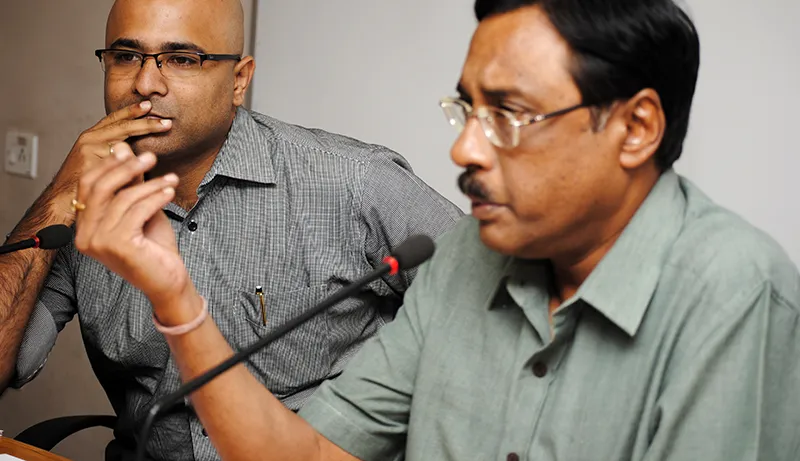-
CENTRES
Progammes & Centres
Location
Noted author of a book on Bhutan, Omair Ahmad, argued that the way forward for India was to acknowledge that it could no longer insulate Bhutan. In the past, India engaged the monarchy and the elite, and the time has come to broaden the relationship, he said.

It is a mistake to associate complications in the Bhutan-India relationship with the democratisation of Bhutan, according to Mr. Omair Ahmad, author of "The Kingdom at The Centre of The World".
Mr Ahmad was delivering a talk on the challenges India faces as Bhutan democratises and expands its economy at Observer Research Foundation (ORF) on July 11. The talk, titled "Bhutan’s transitions and coming challenges for India", was chaired by Mr. Pavan K Varma, former Indian Ambassador to Bhutan and an author of many books.
Mr. Ahmad said in his view, the rapid pace of change in Bhutan, set in motion by economic development, unprecedented urbanization and emergence of big cities, was at the heart of the matter. The fourth king of Bhutan saw democratization of the kingdom as the best way to deal with the challenges posed by development. Development makes people question authority, argued Mr. Ahmad, and went on to point out that the generation coming of age in Bhutan were questioning India, a country they view as an "authority figure to be challenged." Young Bhutanese do not understand the historical contours of India’s relationship with Bhutan. Mr. Ahmad highlighted that the relationship was premised on an agreement by the third King of Bhutan signed during Prime Minister Nehru’s visit to Bhutan in 1958. In it, Bhutan agreed to be a "part of India’s security structure with no holds barred, no questions, and no quibbles." Bhutan fully embraced its relationship with India, and in return, received grants and loans at concessional rates that allowed for prosperous growth.
Mr. Ahmad identified both old and new challenges that India faces with regard to Bhutan. Key among the old challenges is the paradox of maintaining a reciprocal relationship with a country the size of Bhutan (38,394 sq km and a population of 725, 296) that shares a border with China, India’s biggest rival in the region. The presence of China on Bhutan’s border, China’s unresolved border dispute with Tibet, and the expansion of the Nepalese under the Ghorka state all complicate Bhutan’s relationship with India.
Mr. Ahmad stressed that the way forward for India was to acknowledge that it could no longer insulate Bhutan. In the past, India engaged the monarchy and the elite, and the time had come to broaden the relationship. The problem with the current relationship, he argued, was that it happened in a vacuum, without any public diplomacy from the Indian side. He claimed that it was not enough to put India’s best and the brightest on the eastern Himalayas. The current situation called for a conversation between the Indian and Bhutanese publics. He warned that India cannot continue to expect gratitude from Bhutan.
During the discussion, Mr. Varma highlighted that Bhutan had sequestered itself in the past, but had undergone tremendous change in the last five years. He agreed with Mr. Ahmad that more sensitivity was required on the part of Indian diplomats in their dealings with Bhutan. While he highlighted the intricately woven economies of India and Bhutan (India remains Bhutan’s largest trade and development partner), and the amount of goodwill towards India in the country, he stressed that India cannot expect Bhutan not to have a relationship with China, or have aspirations as an independent and sovereign nation. In response to a question posed by one of the participants on the timing of India’s withdrawal of LPG subsidies to Bhutan, Ambassador Varma said that the announcement should have come after the Bhutanese elections, the final round of which takes place on July 13.
Questions were also raised about Bhutan’s relationship with China. Some participants argued that Bhutan’s strategy was to humour both its neighbours, while others disagreed and claimed that Bhutan had sided with India, and put "all its eggs in one basket" as early as 1958. Others went on to problematise India’s paternalistic relationship with its neighbours, and questioned whether India might be "pressing its leverages too hard." The Indian and Chinese models of diplomacy were compared wherein one of the participants argued that China used more of the carrot and less of the stick, while India tended to do the opposite. This was followed by an acute question on whether India was mature enough to deal with the political consequences of the democratisation of its neighbours.
(This report is prepared by Fatima Mushtaq, Research Intern, Observer Research Foundation, Delhi)
The views expressed above belong to the author(s). ORF research and analyses now available on Telegram! Click here to access our curated content — blogs, longforms and interviews.